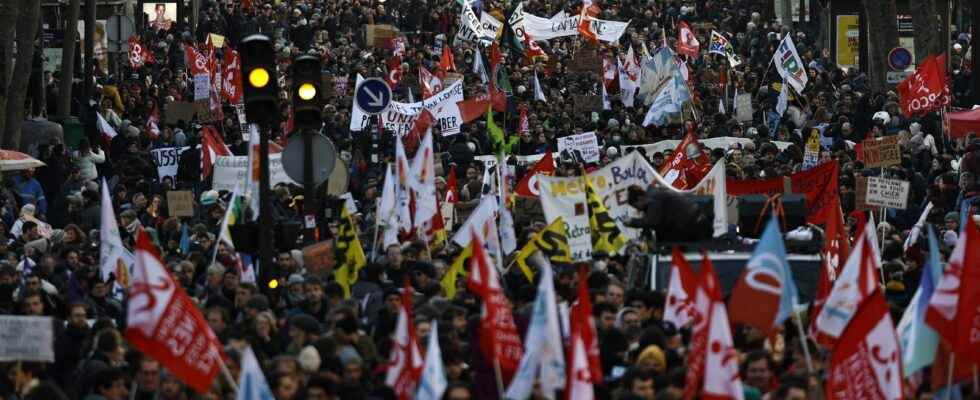For the third day in a month, the eight main trade union organizations (CDFT, CGT, FO, CFE-CGC, CFTC, Unsa, FSU, Solidaires) called for demonstrations throughout France, in order to protest against the plan to reform the government pensions, examined in the Assembly since Monday. United, the unions hoped to continue to put pressure on the executive after two successful days, the authorities recognizing more than a million demonstrators when the CGT announced almost three million on January 31. But did Act III experience the same enthusiasm? The Express takes stock.
Fewer strikers
The number of strikers and demonstrators was expected to decline on Tuesday, the unions already projecting themselves towards the fourth act, Saturday, to maintain pressure on the majority, at the front in the hemicycle. According to the authorities, nearly 757,000 people hit the pavement throughout France, against “nearly 2 million” for the CGT, figures down from last week. According to the CGT, the Parisian demonstration brought together some 400,000 people, as many as on January 19, but 100,000 less than on January 31. It took place in peace, despite some clashes between the Place de la République and the Bastille’s Place. Three arrests were announced by the police headquarters.
Elsewhere in the country, the figures of the processions which took place in the morning already showed a lower participation than last week: for example 5000 in Angoulême according to the authorities, against 8500 on January 31 and 9000 on January 19. Or even Rouen, where the demonstrators were 8,700 according to the prefecture, against 13,800 on January 31 and 13,000 on the 19th. In Caen, after the 26,000 participants last week, the unions claim only 20,000 this Tuesday, when the official figures drop from 18,000 to 15,000. Drop of the same order in Calais, where the unions advance the figure of 6,000 demonstrators (against 8,000 on January 31) and the police 4,000 (against 5,000).
The energy sector particularly affected
In the energy sector, the CGT claims a drop of around 4,500 MW in energy production, the equivalent of more than four nuclear reactors. More than one out of two employees (56%) of TotalEnergies refineries is on strike according to management, while the CGT evokes between 75 and 100% of strikers. “No product leaves the site”, even assured Fabien Cros, representative of the CGT on the side of the Total refinery of La Mède, near Marseille. At EDF, management evokes 36.9% of strikers on Tuesday, against 46.5% last week and 44.5% on January 19.
In the key transport sector, the circulation of trains and metros was “severely disrupted” at SNCF and RATP. But with a rate of strikers fallen to 25%, against 36% on the 31st and 46% on the 19th. However, train traffic will remain “disturbed” on Wednesday February 8, the day when the CGT Cheminots and SUD Rail are still calling for work to be stopped. against the pension reform, said the SNCF. The company plans an average of 2 out of 3 TGVs, with in detail 2 out of 3 trains to the North, “almost normal” traffic to the East, 3 out of 5 trains to the South-East, 1 out of 2 trains to the Atlantic, 2 Ouigo out of 3 and 3 province-province TGV out of 5. Traffic will be normal for Eurostar, “slightly disturbed” for Thalys, and the other international connections will have 4 trains out of 5 on average (except Switzerland, 3 out of 5) . SNCF Voyageurs is counting on 1 Intercités out of 2 and will cancel its night trains. The company also plans to run nearly 1 out of 2 TER, with disruptions in all regions.
Loss of speed in National Education
On the side of the rue de Grenelle, there is talk of a rate of strikers of 12.87% of all staff, against 23.52% last week and especially 35.15% on January 19. With regard to teachers in the only areas that are not on vacation, the decline is of the same order with 14.17% of strikers on Tuesday against nearly 26% on January 31 and 38.50% ten days earlier.
According to a police source, nine university sites and 24 high schools were disrupted in France, with 14 blockages. La Voix lycéenne claimed nearly 150 blocked high schools.
Unions determined
It does not matter that the figures are down: the unions are determined to continue the mobilization. “Tonight’s message will be a call to demonstrate massively on Saturday,” said CFDT general secretary Laurent Berger, recognizing for Tuesday “a small handicap with the holidays”, which started for the area. A. “But the parliamentary debate is until the end of March, and in March there will be no more holidays”, he warned, believing once again that it would be “democratic madness to remain deaf ” to the challenge of the reform.
The leader of the CGT, Philippe Martinez, called for strikes “harder, more massive, more numerous”, “if the government persists in not listening”. “It will take other demonstrations but for us, it’s clear, the rest will be the renewable strike, around March 8”, echoed Simon Duteil (Solidaires).
